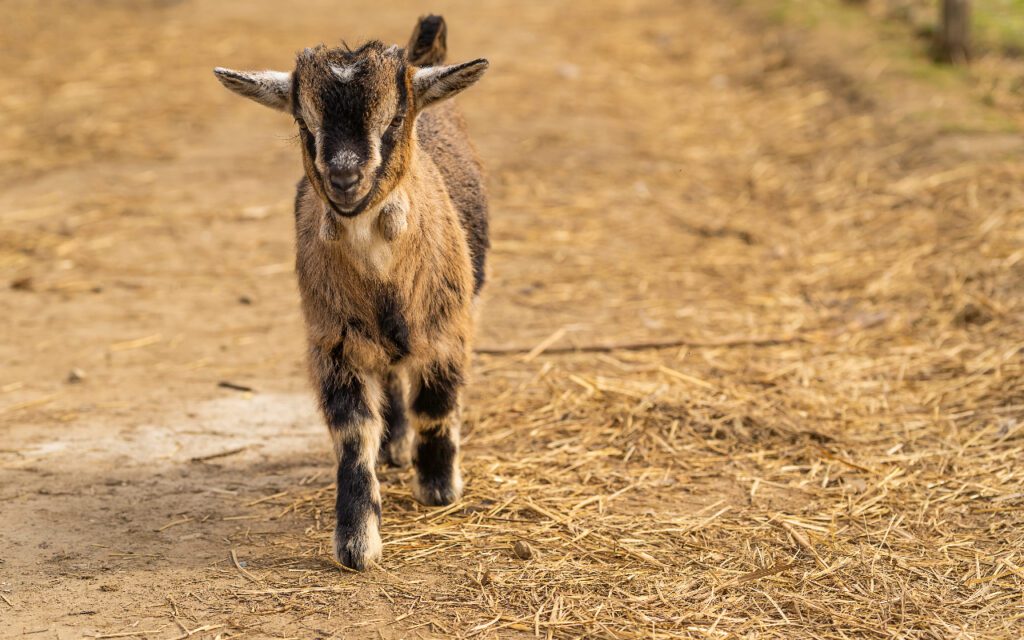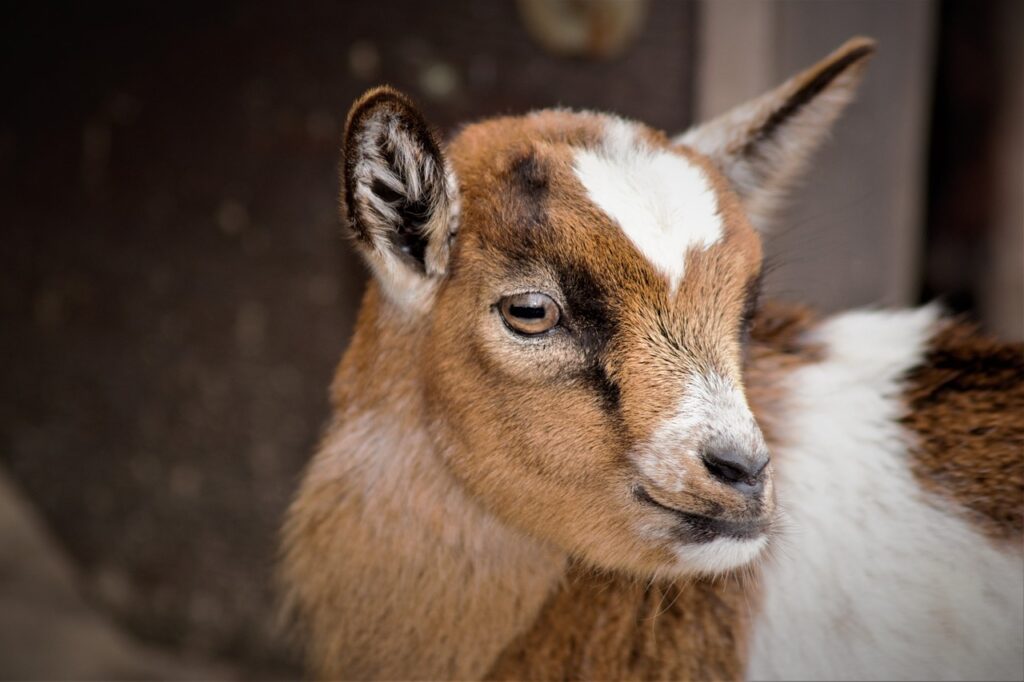Are goats just simple farm animals, or is there more to their bleats and head-butting antics?
Delve into the intriguing world of caprine cognition, where we uncover the surprising intelligence of these hoofed wonders.
Understanding Intelligence in Animals

Understanding intelligence in animals can be a complex task, largely because intelligence manifests in various forms and is influenced by several factors.
Animal intelligence is generally understood as the ability to learn, reason, problem-solve, think abstractly, comprehend complex ideas, and use language.
Here are a few key aspects to consider when trying to understand the intelligence in animals:
- Learning and Memory: The ability to learn from experience and retain that information is a key sign of intelligence. For example, animals might learn to associate a particular sound or signal with food or danger.
- Problem-Solving: Intelligent animals often exhibit the ability to solve problems, often in innovative or creative ways. This can involve the use of tools, manipulation of their environment, or the development of new strategies to overcome challenges.
- Social Behavior: Many animals live in complex social structures that require a certain degree of intelligence to navigate. This can include recognition of individuals, understanding of social hierarchy, cooperation, and even manipulation.
- Communication: Some animals have sophisticated means of communication, which may include vocalization, body language, and even symbolic language. This can indicate a higher level of cognitive function.
- Self-awareness: While this is still a debated topic, some animals have shown signs of self-awareness, which is often considered a mark of advanced intelligence. This is typically tested through the mirror test, where an animal recognizes its reflection as its own.
- Emotional Intelligence: While more difficult to measure, some animals appear to show empathy, understanding, and response to the emotions of others, which indicates a form of emotional intelligence.
Different animals have developed different cognitive abilities depending on their environment, survival needs, and evolutionary history. Intelligence in animals should be seen as a range of capabilities rather than a single characteristic.
Are Goats Smart?

Yes, goats are considered to be quite intelligent animals. They have a strong sense of curiosity and are often able to solve complex tasks.
Their ability to learn and remember is well-documented, and some scientific studies have demonstrated their impressive cognitive abilities. For example, goats have been found to be capable of problem-solving tasks, such as navigating mazes or manipulating objects to obtain food.
Goats are also social animals and show a high degree of emotional intelligence. They can perceive and respond to the emotions of other goats, and they form strong bonds with other members of their herd. In addition, goats have a well-developed sense of spatial memory, allowing them to remember the layout of their environment and the locations of food sources.
Furthermore, some studies have suggested that goats can even differentiate between human facial expressions, demonstrating a level of intelligence often only attributed to animals like dogs and horses.
It’s important to note that intelligence can vary significantly among individual animals, just like it does among individual humans. So while goats as a species are considered intelligent, some goats might be more clever or quick to learn than others.
Evidence of Goat Intelligence
Problem-Solving Skills
Goats have been observed to solve complex tasks and puzzles, demonstrating their problem-solving abilities.
They can learn how to pull levers, open latches, and navigate mazes to obtain food rewards. These skills illustrate a goat’s ability to understand and interact with its environment in a sophisticated way.
Social and Emotional Intelligence
As social animals, goats show a high degree of emotional intelligence. They can perceive and respond to the emotions of other goats, and they form strong bonds with other members of their herd.
This social intelligence helps them to live and work together effectively in a herd.
Spatial Memory
Goats have a well-developed sense of spatial memory. This means they can remember the layout of their environment and the locations of food sources. This ability to recall spatial information is a sign of their cognitive prowess.
Ability to Differentiate Human Expressions
Some studies have suggested that goats can even differentiate between human facial expressions, an ability often attributed to domesticated animals like dogs and horses.
This indicates a level of intelligence that enables them to interpret subtle visual cues.
Learning and Retention
Goats are capable of learning new tasks and retaining this knowledge over time. Once they have learned a task, they can remember how to perform it for years afterward. This learning and retention capacity is another marker of their intelligence.
Environmental Adaptability
Goats are highly adaptable and can thrive in a variety of environmental conditions, which is a testament to their intelligence.
They can quickly learn how to find food and shelter in new environments, indicating their ability to learn and adapt to changing circumstances.
Studies Showcasing Goat Intelligence
- Learning and Problem-Solving Skills: A study published in 2014 in the journal Frontiers in Zoology revealed that goats have excellent learning and problem-solving skills. The researchers trained the goats to retrieve food from a box by pulling a lever and found that the goats were able to learn this task quickly and remembered how to do it up to ten months later.
- Emotional Intelligence and Social Learning: A study published in 2016 in the journal Royal Society Open Science suggested that goats can read subtle body language cues from other goats. The goats in the study would watch their peers learn which food was safe to eat.
- Differentiating Human Expressions: A research paper published in 2018 in the journal Royal Society Open Science found that goats can differentiate human expressions. The study showed that goats preferred to interact with happy human faces over angry ones, indicating their ability to recognize and react to human emotional cues.
- Excellent Navigational Skills: A study published in 2013 in the journal Applied Animal Behaviour Science highlighted the impressive navigational skills of goats. The study found that goats are adept at using various types of cues to navigate, including distant landmarks and the position of the sun.
These studies and others like them show that goats have remarkable cognitive abilities, including problem-solving skills, social learning, the ability to read human expressions, and navigational skills.
Comparing Goat Intelligence to Other Animals
Goat intelligence has been compared to that of many other animals, and while they may not be as symbolically cognitive as apes or dolphins, or as trainable as dogs, they exhibit several traits that place them high on the intelligence scale.
Let’s take a look at a few comparisons:
- Dogs: Dogs are known for their high level of trainability and responsiveness to human cues, including commands and emotional expressions. Goats, on the other hand, while they may not be as responsive to commands as dogs, have shown the ability to differentiate human facial expressions, which is quite impressive. In terms of problem-solving and adaptability, goats and dogs have both shown significant capabilities.
- Cats: Cats are known for their independent and curious nature, traits that are also seen in goats. Like cats, goats are adept at exploring and navigating their environment. However, goats tend to exhibit stronger social bonds and are more reliant on herd dynamics than cats, which are more solitary.
- Cattle: As both cattle and goats are herd animals, they exhibit social behaviors and form complex hierarchical structures within their groups. However, goats have often been seen as more curious and interactive with their environment, showing a level of intelligence and problem-solving that’s typically higher than cattle.
- Pigs: Pigs are highly intelligent animals, known for their problem-solving skills, adaptability, and social structure. Like pigs, goats also display these attributes, showcasing problem-solving skills, adaptability to different environments, and a complex social structure.
- Sheep: Sheep and goats are often compared because of their similar size and domestication history. Both are social animals with complex herd dynamics. However, studies often find that goats are more curious and explorative, suggesting a higher level of problem-solving and general intelligence.
Factors Influencing Goat Intelligence
Several factors can influence the intelligence of goats, similar to other animals. These include genetic factors, environment, social structure, individual experiences, and overall health and well-being.
Genetic Factors
Just like in humans, individual genetic variations can affect a goat’s cognitive abilities. Certain breeds of goats may exhibit different traits and behaviors, some of which may be associated with intelligence.
Environment
The environment in which a goat is raised and lives can significantly impact its intelligence.
Enriched environments that provide mental stimulation, such as diverse terrains for exploration, puzzle feeders, or interaction with humans and other animals, can enhance a goat’s cognitive abilities.
Conversely, an environment lacking stimulation can lead to decreased cognitive function.
Social Structure
Goats are herd animals with complex social structures. Interactions within the herd can stimulate cognitive development, as goats learn to communicate, establish hierarchies, and navigate social relationships.
Individual Experiences
Individual experiences also play a role in a goat’s intelligence. Just like humans, goats can learn from their experiences. These learning opportunities can shape their problem-solving skills, their understanding of their environment, and their ability to adapt to new situations.
Health and Wellbeing
A goat’s overall health and well-being can impact its cognitive function. Proper nutrition is essential for brain development and function. Similarly, stress or illness can negatively affect a goat’s cognitive abilities.
In Conclusion
In the realm of animal intelligence, goats truly stand out. Their problem-solving prowess, social acuity, and impressive adaptability paint a picture of an underestimated genius in the barnyard.
So, next time you see a goat, remember, there’s likely a keen intellect behind those rectangular pupils.


Leave a Reply